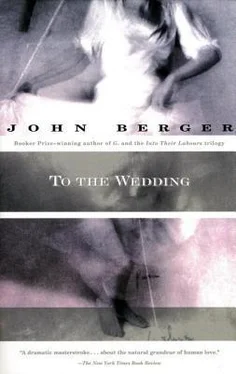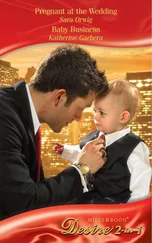John Berger - To the Wedding
Здесь есть возможность читать онлайн «John Berger - To the Wedding» весь текст электронной книги совершенно бесплатно (целиком полную версию без сокращений). В некоторых случаях можно слушать аудио, скачать через торрент в формате fb2 и присутствует краткое содержание. Год выпуска: 2011, ISBN: 2011, Издательство: Knopf Doubleday Publishing Group, Жанр: Современная проза, на английском языке. Описание произведения, (предисловие) а так же отзывы посетителей доступны на портале библиотеки ЛибКат.
- Название:To the Wedding
- Автор:
- Издательство:Knopf Doubleday Publishing Group
- Жанр:
- Год:2011
- ISBN:978-0-307-79420-8
- Рейтинг книги:3 / 5. Голосов: 1
-
Избранное:Добавить в избранное
- Отзывы:
-
Ваша оценка:
- 60
- 1
- 2
- 3
- 4
- 5
To the Wedding: краткое содержание, описание и аннотация
Предлагаем к чтению аннотацию, описание, краткое содержание или предисловие (зависит от того, что написал сам автор книги «To the Wedding»). Если вы не нашли необходимую информацию о книге — напишите в комментариях, мы постараемся отыскать её.
To the Wedding — читать онлайн бесплатно полную книгу (весь текст) целиком
Ниже представлен текст книги, разбитый по страницам. Система сохранения места последней прочитанной страницы, позволяет с удобством читать онлайн бесплатно книгу «To the Wedding», без необходимости каждый раз заново искать на чём Вы остановились. Поставьте закладку, и сможете в любой момент перейти на страницу, на которой закончили чтение.
Интервал:
Закладка:
Jean, standing behind Zdena, surveys the crowd like a delegate at a political meeting; throughout his whole adult life he has only worn a shirt and tie when attending Congresses. The word Comrades is on the tip of his tongue. Impulsively he puts his large hand on Zdena’s shoulder. She touches it immediately with her fingers which ache.
Suddenly the bride and bridegroom are there. A rain of rice. A woman claps, carried away by memories. The curato beams.
The air plucking at Ninon’s veil, her white flaring skirt with its quivering lace hems, her loose billowing sleeves buttoned tight around her wrists, the glistening silver shoes on which she walks so delicately as they come forward into the square, that she seems to be half tottering and half gliding, and the manner in which Gino places his feet, as if any one of his steps might have to suddenly anchor them both — all this suggests the force of a mysteriously gentle yet irresistible gale. Have you noticed it blowing at other weddings? At this one the expression of the couple’s eyes has been swept by the gale too.
Zdena and Jean gaze at their daughter and their son-in-law and at this moment their own faces are as astounded as children’s.
They’re married, a man shouts, Long Live the Bride!
A picture please, says the official photographer from Ferrara, a picture, please, with the bride holding her bouquet.
Fetch the bouquet! She left it in the church.
It’s blown away, whispers a little girl, not knowing why she says this.
Gino takes Ninon’s hand, moves closer, and standing side by side, her shoulder pressing against him, the two of them wait for the gale to pass.
Give him a kiss, calls out Ercole the spice man, come on, give him a kiss.
Ssshhh! They’ve a lifetime for that. Let them be. Tranquillo .
She’s so lovely, declares Mimi, the wife of Luca the pastry cook, so lovely she should have ten children! She counts the babies on her ten plump fingers.
Nobody has ten children these days, Mimi.
The young know things our parents didn’t.
It must have taken hours and hours to do her hair in all those little plaits.
What are they called?
People call them dreadlocks. But they’re wrong. Never seen so many.
The waiters are handing out glasses of sparkling wine.
Marella catches Ninon’s eye and sends her a kiss with her hand. In her own eyes there are tears.
After the last photo, Ninon pulls at her husband’s arm. The gale has abated. Her husband leans his head towards her and she says into his ear: So we’re running together, Hare, are we? I have to do everything today … everything, you understand.
He will show her the lucioperca lying on the silver platter, varnished with aspic, shining as if moonlit, every scale silver or gold, bejewelled with almonds, coriander leaves and ruby-red pimentos, and he will turn the platter so Ninon can see the lucioperca standing on her tail, waiting like a dancer in a long clinging dress for the music to begin. And at this moment Ninon will take hold of Gino’s finger, and with the finger she will slowly trace down her own body the lateral line he taught her. When she releases his finger, she will tap with the toe of her shoe on the grass under the apple trees and she will order him: Look at me, husband, I’m your wife now. And then she will laugh. A laugh which comes from another time and from a language that has been lost.
They will sit side by side at the large table, surrounded by thirty people, and she will notice everything which is happening. Nothing will escape her. Wedding feasts are the happiest because something new is beginning, and with the newness comes a reminder of appetite, even to the oldest guests.
Renzo and Ercole will carry Emanuela out of the house on their shoulders and she’ll hold, high up above her head, a plate as wide as a bicycle wheel, piled with eels cooked in her own fashion. She cuts them into thick slices and impales them on a spit with sage, bay leaves and sprigs of rosemary, and bastes them before a fierce fire with their own oil, till their skins turn almost black. Then she serves the eels on the plate as wide as a bicycle wheel with the Mostarda di Cremona which is made from mustard oil, melons, pumpkins, little oranges, apricots, according to a recipe which dates back to the time of Sikelidas. Wonderful, said the same Sikelidas, wonderful the spring winds for mariners who long to set sail …
Ninon will be the first to clap, men will cheer, and Emanuela, the widow, her face flushed from the fire, will suddenly remember her husband saying to her: If you’d like to marry me, I have this house and a boat …
The two men lower the widow to the ground and she places her dish on the table in front of the newlyweds and Ninon kisses her, and only then does Emanuela take the hem of her apron to dab at her eyes.
Jean is distributing bottles of spumante in blue buckets full of broken ice: the plastic buckets are the ones Aunt Emanuela’s husband used on his fishing boat before he died. After Jean has opened a bottle and filled the nearest glasses, he sits down beside Marella. Other bottles pop as they are opened under the apple trees around them.
I’d know you were Ninon’s father anywhere, says Marella.
We look alike?
It’s the way you smile.
For a moment Jean is shy, lost for words.
You’re her best friend, he says at last.
In Modena, yes, I am. Have you noticed? Nobody can take their eyes off her, even when they’re eating.
She’s the bride, says Jean.
And she’s so determined, so determined to live. She says this quietly, their two heads close together. You have a tough daughter, Signor Ferrero.
You’ve been a great help to her.
I’m her friend, yes, and I feel closer to her than I ever have. But what could I do? I invented the word STELLA. And I told Gino to be patient. I told him she was dead. Dead. When you learn what she learnt, it kills you. I told him he had to wait and perhaps, just perhaps, she might have a second life, if he really wanted her, I added. And you know how he replied? He surprises me, Gino does, he never hesitates. Her second life, he said, will begin on our wedding day. They’d never thought of marriage before. Now look at them.
Zdena is sitting beside Scoto, the watermelon seller.
Happy? asks Scoto, are we happy?
Zdena lowers her eyes.
The sun is in your eyes? He asks, miming the dazzle and offering her his sunglasses. She shakes her head and finds her own sunglasses in her meticulously arranged handbag.
Everyone is eating and talking, joking and drinking. The cascading noise of feasts which nobody can recall until they are fortunate enough to find themselves at another.
Good? The melon seller asks Zdena.
First time, says Zdena.
Behind Scoto’s sad joker’s eyes there’s a love of questions which cannot be answered. A great mystery, he says, like everything.
Like some things.
Many things, Signora, and the most mysterious of all creatures is the anguilla .
He looks to Jean on the other side of the table, hoping he will translate.
Misterioso .
Jean translates sentence by sentence.
They have no lungs, begins Scoto, and they live for days out of water. Nobody knows how. They swim, swim very fast, and they cross overland. When they make a hole in the earth, they make it like a corkscrew tail first!
Zdena, as she listens to the story of the eels, gazes at her daughter.
The females are larger than the males and when they are ready to lay their eggs their bellies turn silver and their faces fill out and they smile … When the high tides come, they taste the saltier water and it makes them want to leave the river for the sea. This is the sacred moment for catching them. Millions of anguille swim into the traps which are called lavoriere . Yet some escape. We don’t know how. Everything about these creatures is mysterious.
Читать дальшеИнтервал:
Закладка:
Похожие книги на «To the Wedding»
Представляем Вашему вниманию похожие книги на «To the Wedding» списком для выбора. Мы отобрали схожую по названию и смыслу литературу в надежде предоставить читателям больше вариантов отыскать новые, интересные, ещё непрочитанные произведения.
Обсуждение, отзывы о книге «To the Wedding» и просто собственные мнения читателей. Оставьте ваши комментарии, напишите, что Вы думаете о произведении, его смысле или главных героях. Укажите что конкретно понравилось, а что нет, и почему Вы так считаете.












